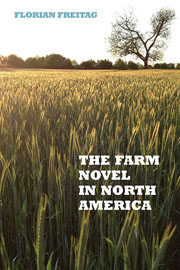 The Farm Novel in North America
The Farm Novel in North America Book contents
- Frontmatter
- Contents
- Acknowledgments
- Introduction
- 1 Surveying the Fields
- 2 Early Sowings: St. John de Crèvecocur's “History of Andrew, the Hebridean,” Patrice Lacombe's La terre paternelle, and Susanna Moodie's Roughing It in the Bush
- 3 Laws of Nature: Frank Norris's The Octopus, Albert Laberge's La Scouine, and Frederick Philip Grove's Settlers of the Marsh
- 4 New World Demeters: Willa Cather's O Pioneers!, Louis Hémon's Maria Chapdelaine, and Martha Ostenso's Wild Geese
- 5 Rich Harvests: Joseph Kirkland's Zury: The Meanest Man in Spring County, Claude-Henri Grignon's Un homme et son péché, and Frederick Philp Grove's Fruits of the Earth
- 6 Fields of Crisis: John Steinbeck's The Grapes of Wrath, Félix-Antoine Savard's Menaud, maître-draveur, and Robert J. C. Stead's Grain
- 7 The Cycle of Seasons: Louis Bromfield's The Farm, Ringuet's Trente arpents, and Grace Campbell's The Higher Hill
- Epilogue
- Works Cited
- Index
5 - Rich Harvests: Joseph Kirkland's Zury: The Meanest Man in Spring County, Claude-Henri Grignon's Un homme et son péché, and Frederick Philp Grove's Fruits of the Earth
Published online by Cambridge University Press: 05 December 2013
- Frontmatter
- Contents
- Acknowledgments
- Introduction
- 1 Surveying the Fields
- 2 Early Sowings: St. John de Crèvecocur's “History of Andrew, the Hebridean,” Patrice Lacombe's La terre paternelle, and Susanna Moodie's Roughing It in the Bush
- 3 Laws of Nature: Frank Norris's The Octopus, Albert Laberge's La Scouine, and Frederick Philip Grove's Settlers of the Marsh
- 4 New World Demeters: Willa Cather's O Pioneers!, Louis Hémon's Maria Chapdelaine, and Martha Ostenso's Wild Geese
- 5 Rich Harvests: Joseph Kirkland's Zury: The Meanest Man in Spring County, Claude-Henri Grignon's Un homme et son péché, and Frederick Philp Grove's Fruits of the Earth
- 6 Fields of Crisis: John Steinbeck's The Grapes of Wrath, Félix-Antoine Savard's Menaud, maître-draveur, and Robert J. C. Stead's Grain
- 7 The Cycle of Seasons: Louis Bromfield's The Farm, Ringuet's Trente arpents, and Grace Campbell's The Higher Hill
- Epilogue
- Works Cited
- Index
Summary
In his 1941 preface to Un homme et son péché ([1933] 1986), Claude-Henri Grignon writes that materialism is an integral part of the universal “âme paysanne”: “Des usuriers, des grippe-sous, des passionnés de l'argent tel que mon Séraphin, ils ne sont pas rares en terre canadienne…. Non pas seulement ici, mais en France; non pas seulement en France, mais dans tous les pays où la paysannerie s'accroche au sol” (219–20). Especially during the 1920s and the 1930s, many North American farm novels portrayed rural misers or materialistic farmers. The topic became so prominent that in 1942 the French Canadian journalist, novelist, and literary critic Harry Bernard chose to specifically examine “Romans de l'avarice” in the first— and to date the only—comparative North American study of farm novels. Quite in contrast to Grignon's statement, however, North American farm novels depict materialists and misers not as typical representatives of the “âme paysanne,” but as elements out of place on the farm, as “machines in the garden.” As they usually either are reformed or meet an exceptionally tragic fate in the novels, the texts insist that although these “machines” may occasionally find their ways into the garden, the farm is a space for rich harvests, not for materialists.
- Type
- Chapter
- Information
- The Farm Novel in North AmericaGenre and Nation in the United States, English Canada, and French Canada, 1845-1945, pp. 186 - 223Publisher: Boydell & BrewerPrint publication year: 2013


